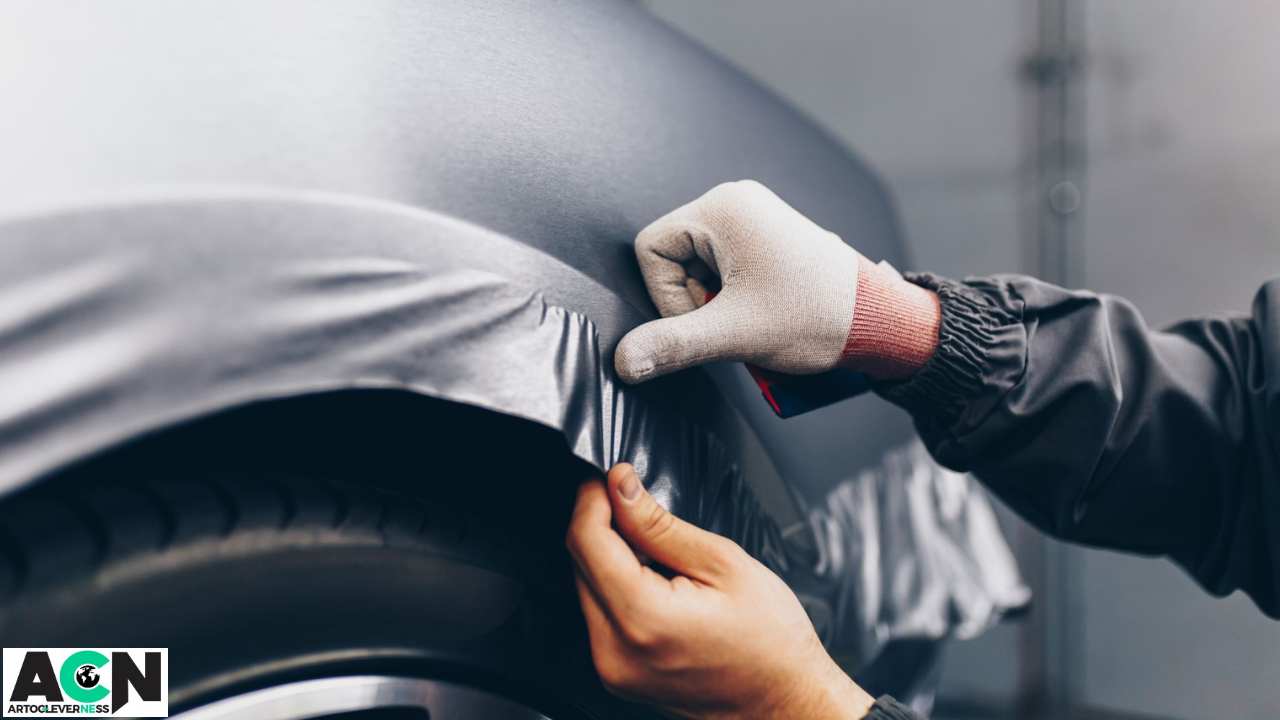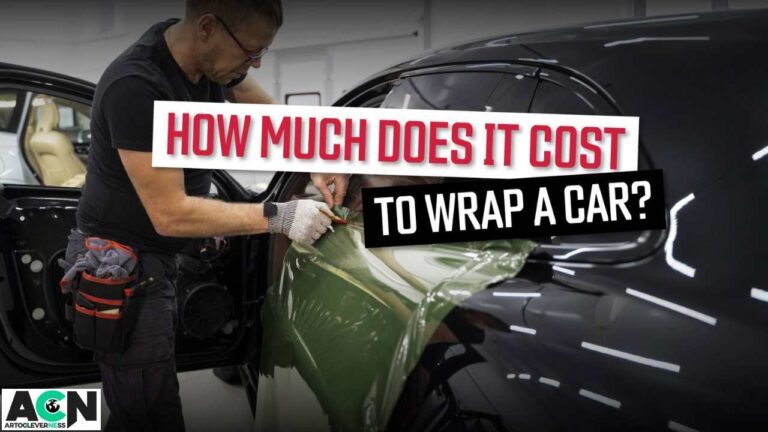Changing a car’s look has led to wrapping for most people. Protecting paint or the vehicle’s look can be achieved with a fresh, customized look through vinyl wrapping. However, one of the many questions coming up is, how much does it cost to wrap a car?
The cost varies with the size of your vehicle, the kind of wrapping material, and labor. A full wrap can cost between $1,500 and $5,000, making the procedure much more adaptable than painting a car.
If you want to know just how much detail you’ll read about while studying every part of car wraps, you’ve come to the proper place. I will tell you everything you want to learn about car wraps!
What is a Car Wrap?
A car wrap is just a giant vinyl decal that covers the exterior of a car. It may cover the entire vehicle or features like the bonnet or entrances.
These wraps come in different finishes-from matte to gloss, satin, and chrome-to allow owners to have almost boundless creativity and freedom to give a car the look they want.
Unlike paint jobs, wraps are temporary and are made to leave without doing much damage to the car’s factory paint.
Why would a car owner wrap his car rather than paint it?
There are several reasons why people prefer vinyl wraps over paint jobs. One of these is cost. Compared to the price of a full-body paint job, which is pretty penny-sized, depending on the kind of car and finish, the price of a wrap is often cheaper.
Besides, wraps might be easier to remove and replace should you want a new look; repainting is a relatively permanent affair that takes time.
How much does it cost to vinyl wrap a car?
How much does it cost to get a car wrapped?
- Size of a Car: As a car is extended, its bigger size will require more material, making it costlier.
- Wrap Type: All wrap types, such as Matte, gloss, chrome, and carbon fiber, have different costs.
- Labor: Manpower or the individual or area installing it may vary as it requires money.
- Design: A custom car wrap with an original design or logo will be costlier.
How Long Does My Car Wrap Last?
A grade vinyl wrap lasts 3 to 7 years, depending on how well it is managed. Early damage is caused by weather, the sun, and frequent washing. Good-quality wrap materials also extend the lifespan.
Comparison of Wraps in Cost
- Gloss Wrap is more cost-effective than paint and looks like paint ($1,500-$3,000).
- Matte Wrap: Sleek and trendy ($2,000 – $4,000).
- Chrome Wrap: Extremely reflective but pricey ($5,000 – $8,000).
- Carbon Fiber Wrap: Difficult for the looks ($2,500 – $6,000).
Partial Wraps vs. Full Wraps: Which is Better?
A partial wrap would protect a portion of your car regions, like the hood and ceiling, and it is incomparably more affordable to keep a full wrap.
A full wrap would thoroughly shield and guard your car but would be more expensive. Everything boils down to your funding and what you like.
How Much Will It Cost to Have Your Car Professionally Wrapped?

Standard Professional Car Wrap Installations generally cost between $2,000 and $6,000, depending on the shop’s importance, materials, and the complexity of the duty.
A professional installer ensures a smooth finish, which is easier to achieve if anyone uses the DIY wraps themselves.
Is it cheaper to DIY car wrap?
This is more cost-effective but involves spending a lot of money on installing the kit, which is $500 to $1,500. Still, one must have some skills to finish the job independently. Mistakes may lead to bubbles, wrinkles, and peeling.
Aftercare and Cleanliness of Wrapped Vehicles
For the car wrap to last, it should be hand-washed since automatic car washes may damage and scratch the material. Bypass severe chemicals, and that would be ideal if you have a shady place for your car’s parking.
How Long Does It Take to Wrap a Car?
Typically, a professional wrap job will take 1-3 days, depending on the size of your car and the sophisticated method you are using.
If it’s a custom format, depending on the time required to print and establish the wrap, it will take longer than the noted overhead.
Car Wraps Legal Considerations
Some states are fussy and require a color-change report on an automobile, even if the alteration is the vinyl wrap. In some cases, it would be wise to do some pre-searching to determine which local jurisdictions have odd or restrictive color legislation, like reflective or chrome wraps.
Selecting a Suitable Car Wrap Installer
A good and reputable car wrap installer will ensure a smooth and durable finish. Ask to view previous work, get customer reviews, and ensure they provide a service warranty. A few of them even offer warranties of up to 5 years.
Conclusion
Car wrapping is one of the best techniques for changing the look without permanence and high cost, like traditional painting. The price is entirely variable depending on size, type of vehicle, type of wrap, and expertise of an installer.
It may be aesthetically intended or to protect your vehicle’s original paint. First, one should know the process and the costs involved. For most individuals, the lowest line for the query “How much does it cost to wrap a car?” is funding and expected result.
Skilled work generally costs $1,500 to $5,000. A contract can be held long-term by trying it, which is always cash well paid for the coming years.
(FAQs)
How long does a car wrap last?
A care well-taken vinyl wrap lasts from 3 to 7 years. Nonetheless, harsh weather or poor care can make its life short.
Does the car wrap peel off without scarring the paint?
A removable vinyl wrap will not damage the original painting if an expert removes it properly. This makes it reversible and flexible.
Can I do it myself?
DIY wrap kits are available, priced between $500 and $1,500. In any event, applying a car wrap does require specific skills: if something goes wrong, you will most likely end up with bubbles, wrinkles, or peeling off, which is pretty hard to correct.
Would my car insurance be affected by car wrapping?
Most of the time, a vinyl wrap will have no direct implications for you regarding insurance. Still, the provider should know if it changes the vehicle’s appearance considerably because it may affect the coverage or settlement of claims.


